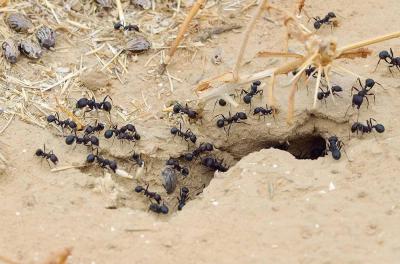Ant colonies do not consist of homogeneous groups that resemble soldiers or workers, but a recent study has shown that their members exhibit a variety of behaviors. The "personality" of ants affects these wingless organisms' colonies, according to a study published on Wednesday, which supports the hypothesis that these small creatures do not conform to any "social matching" even within their own group.
Unlike what might be suggested by soldiers or workers, ant colonies demonstrate a diversity of behaviors, similar to many other groups of what are known as "social animals." However, understanding the interaction between "individual and collective behavior remains a significant challenge in behavioral and evolutionary biology," noted a study published in the journal "Biology Letters," issued by the Royal Society. This is due to the lack of a "clear answer to the question of whether individual behavior changes when it finds itself in a group," explained co-author of the study, behavioral scientist Patricia Dittour, to AFP.
The research team at the Experimental and Comparative Behavioral Lab at Sorbonne Paris Nord aimed to find an answer using the ant species Aphaenogaster senilis. Initially, Dittour subjected a hundred worker ants to two tests that revealed the "presence of personality traits." These traditional tests measured each insect's willingness to leave the nest, in this case, a test tube, and then move varying distances within a defined area.
The researchers then formed groups of ants that were homogeneous regarding their exploratory personality, seeking to "determine whether their behavior would change depending on the group they belonged to." These groups were subjected to tests that involved significant survival tasks. Among these tasks were recognizing and attacking an enemy, gathering small dead flies to feed the nest, and moving ant larvae to a new nest when the old one was no longer available.
The team found it unsurprising that "the groups composed of exploratory ants excelled in all tasks," according to Professor Dittour. In groups of ants less inclined to adventure, the researchers expected that some ants would move and change their behavior, but that did not occur.
In other words, the experiment confirmed, consistent with the "behavioral type" hypothesis, that "an ant's personality does not change when it is within a group," Dittour reported. Nonetheless, there is certainly a benefit in the colony from the less adventurous ants, as the researcher, who has studied social insects for 30 years, pointed out. If the non-adventurous ant is not very useful in major and critical tasks, it is certainly beneficial for taking on other essential roles for the colony's survival.
From this perspective, it would be "interesting in the future to form heterogeneous groups to test their performance" compared to homogeneous groups, according to Professor Dittour. Each ant excels in at least one task, and very few are gifted in more than one. The research team at the Experimental and Comparative Behavioral Lab observed that out of 280 ants, only five were "elite" capable of participating in at least three of the four test tasks.




